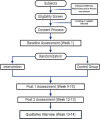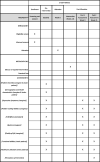Study protocol of a telephone problem-solving intervention for Spanish-speaking caregivers of veterans post-stroke: an 8-session investigator-blinded, two-arm parallel (intervention vs usual care), randomized clinical trial
- PMID: 36932321
- PMCID: PMC10022053
- DOI: 10.1186/s12875-022-01929-y
Study protocol of a telephone problem-solving intervention for Spanish-speaking caregivers of veterans post-stroke: an 8-session investigator-blinded, two-arm parallel (intervention vs usual care), randomized clinical trial
Abstract
Background: Stroke is one of the leading causes of death and the main cause of long-term disability in the United States. The significant risk factors of stroke among Hispanics are well-documented. The majority of stroke survivors return home following a stroke and are cared for by family caregivers. Due to the abrupt nature of strokes, caregivers experience unexpected changes and demands that oftentimes lead to caregiver burden and depression. Given the significant risk factors for stroke in Hispanics and the influence of culture in family norms and family management, we developed a telephone and online problem-solving intervention for Spanish-speaking stroke caregivers. This study tests the impact of a telephone and online problem-solving intervention for Spanish-speaking stroke caregivers on caregiver outcomes.
Methods: The design is a two-arm parallel randomized clinical trial with repeated measures. We will enroll 290 caregivers from 3 Veterans Affairs (VA) medical centers. Participants randomized into the intervention arm receive a problem-solving intervention that uses telephone and online education and care management tools on the previously developed and nationally available RESCUE en Español Caregiver website. In the usual care group, participants receive the information and/or support caregivers of veterans with stroke normally receive through existing VA resources (e.g., stroke-related information and support). The primary outcome is change in caregiver's depressive symptoms at 1- and 12-weeks post-intervention. Secondary outcomes include changes in stroke caregivers' burden, self-efficacy, problem-solving, and health-related quality of life (HRQOL) and veterans' functional abilities. We will also determine the budgetary impact, the acceptability of the intervention and participation barriers and facilitators for Spanish-speaking stroke caregivers.
Discussion: This is an ongoing study. It is the first known randomized controlled trial testing the effect of a telephone and online problem-solving intervention in Spanish for caregivers of veterans post-stroke. If successful, findings will support an evidence-based model that can be transported into clinical practice to improve the quality of caregiving post-stroke.
Trial registration: ClinicalTrials.gov: NCT03142841- Spanish Intervention for Caregivers of Veterans with Stroke (RESCUE Español). Registered on February 23, 2018. Protocol version 8. 08.11.2022.
Keywords: Caregiver Burden; Culturally-relevant Intervention; Depression; Health Education; Hispanic Americans; Minority Health; Problem-solving; Quality of Life; Stroke Caregiving; Veterans.
© 2023. This is a U.S. Government work and not under copyright protection in the US; foreign copyright protection may apply.
Conflict of interest statement
The authors have no conflicts of interest to declare.
Figures
Similar articles
-
Postdischarge Intervention for Stroke Caregivers: Protocol for a Randomized Controlled Trial.JMIR Res Protoc. 2020 Nov 11;9(11):e21799. doi: 10.2196/21799. JMIR Res Protoc. 2020. PMID: 33174856 Free PMC article.
-
Effectiveness of a strength-oriented psychoeducation on caregiving competence, problem-solving abilities, psychosocial outcomes and physical health among family caregiver of stroke survivors: A randomised controlled trial.Int J Nurs Stud. 2018 Nov;87:84-93. doi: 10.1016/j.ijnurstu.2018.07.005. Epub 2018 Jul 28. Int J Nurs Stud. 2018. PMID: 30059815 Clinical Trial.
-
Effect of a telephone and web-based problem-solving intervention for stroke caregivers on stroke patient activities of daily living: A randomized controlled trial.Clin Rehabil. 2023 Aug;37(8):1062-1073. doi: 10.1177/02692155231157301. Epub 2023 Feb 27. Clin Rehabil. 2023. PMID: 36847253 Clinical Trial.
-
Remotely delivered information, training and support for informal caregivers of people with dementia.Cochrane Database Syst Rev. 2021 Jan 4;1(1):CD006440. doi: 10.1002/14651858.CD006440.pub3. Cochrane Database Syst Rev. 2021. PMID: 33417236 Free PMC article.
-
Interventions for Psychological Health of Stroke Caregivers: A Systematic Review.Front Psychol. 2019 Sep 6;10:2045. doi: 10.3389/fpsyg.2019.02045. eCollection 2019. Front Psychol. 2019. PMID: 31551881 Free PMC article.
References
-
- Daviglus ML, Talavera GA, Avilés-Santa ML, Allison M, Cai J, Criqui MH, et al. Prevalence of major cardiovascular risk factors and cardiovascular diseases among Hispanic/Latino individuals of diverse backgrounds in the United States. JAMA. 2012;308(17):1775–1784. doi: 10.1001/jama.2012.14517. - DOI - PMC - PubMed
-
- Cruz-Flores S, Rabinstein A, Biller J, Elkind MS, Griffith P, Gorelick PB, et al. Racial-ethnic disparities in stroke care: the American experience: a statement for healthcare professionals from the American Heart Association/American Stroke Association. Stroke. 2011;42(7):2091–2116. doi: 10.1161/STR.0b013e3182213e24. - DOI - PubMed
Publication types
MeSH terms
Associated data
LinkOut - more resources
Full Text Sources
Medical
Research Materials


